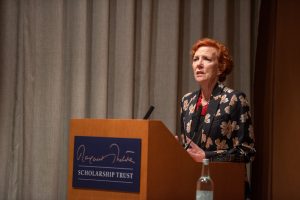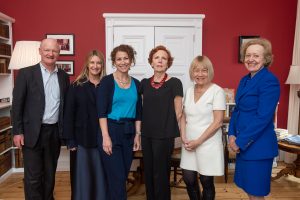Somerville’s Principal Jan Royall reflects on the achievements of great women like Dorothy Hodgkin and Margaret Thatcher, and considers how far we have left to go to achieve equality.
This speech was given on 17 May 2019 in Somerville’s Flora Anderson Hall to open a panel event on the question “does a woman have to behave like a man to succeed in this world?”. The event marked both the 40th anniversary of Margaret Thatcher’s election as the first woman Prime Minister and the centenary of the Sex Disqualification (removals) Act, which allowed women to enter the professions.
Welcome to Somerville College, founded in 1879 with the mission of including the excluded, who at the time were women. We are delighted to have been a mixed College since 1994 but we are also fiercely proud of our history and heritage. There could be no better place to mark 40 years since the country elected its first woman Prime Minister and 100 years since women were allowed to enter the professions.
In the last 140 years the College has nurtured thousands of women who until relatively recently were most certainly living in a man’s world – and I would suggest that many still are. Notwithstanding the countless cultural and legislative barriers, our alumni were catalysts for change in our communities, to our country and to our world. Some of them were invisible to the wider world whilst being extraordinarily successful and responsible for huge advances in science, in public policy, in public service, in business, in academia, in medicine, in literature and the arts.
Somerville’s women are a testament to the difference that women have made, are making and will continue to make. They have blazed a trail and inspired other women to see themselves as philosophers like the illustrious trio of Mary Midgley Philippa Foot and Elizabeth Anscombe; as diplomats like Anne Warburton, the first woman to be a British Ambassador; or Booker Prize winning authors like Iris Murdoch and A S Byatt.
They have shown other women that it is possible to enter politics and bring about change from Eleonor Rathbone to Shirley Williams to our current parliamentarians. Yesterday I led a debate in the Lords on the mental health of children and young people. It was answered by another Somervillian – Baroness Blackwood of North Oxford.
Somerville’s women have lifted the barriers for other women. Cornelia Sorabji, who in 1889 was the first female to study law at Oxford having been the first woman to graduate from Bombay University, is a great example of a woman who supported other women, campaigning for girls’ education and the legal rights of Indian women living in purdah.
And now we have pioneering businesswomen like Clara Freeman, Ayla Busch, Sybella Stanley, Shriti Vadera and Sasha Romanovitch who, in the 21st century, are still working in a world dominated by men.
We have, and have had, scientists whose ground-breaking research changes lives, the most eminent being Dorothy Hodgkin, a chemist, and still the only British woman scientist to have won a Nobel Prize. In press coverage of the prize she was described not as a leading scientist but as an “Oxford housewife”. She used her prize money in 1964 to set up the Somerville nursery and was the first Fellow to have enjoyed maternity leave. Most importantly, she was also tutor to perhaps our most famous alumni, Margaret Thatcher, who was elected Prime Minister on 4th May 1979. Even 40 years ago she was very much a woman in a man’s world, just one of 19 women in a House of Commons of 635 MPs.
It is no secret that I did not share Lady Thatcher’s politics, but she was a truly remarkable woman and I am immensely proud that our first woman Prime Minister was a Somervillian. Indeed, she was one of the most influential Prime Ministers this country has ever seen. Mrs Thatcher was a polarising figure, but whether you agreed with her or not, she was a giant in politics, she had the leadership qualities that are sorely lacking in both Government and Opposition today.
Whilst she dominated my early political life I did not meet her until I went to the Lords by which time she was increasingly frail, but her appearances were always electrifying. For a brief period in 2008 I was Government Chief Whip in the Lords and when I saw Lady Thatcher in her place on the benches opposite, I knew that I had problems! Briefly looking at Hansard this morning I noticed that one of these appearances related to an amendment on the Climate Change Bill. The amendment was won, my government lost, and I must have had some explaining to do around the cabinet table. In recent weeks and, thanks in part to a strong young woman, Greta Thunberg, there has been a much needed focus on climate change. It is too little known that Margaret Thatcher was the first head of government to speak up publicly about climate change and the risk to the global environment. Indeed she exerted a profound influence on the world in so many ways, including recognition of the opportunity offered by Gorbachev’s accession to power in the Soviet Union to end the Cold War.
Margaret Thatcher says in her memoirs “Before I went up to Oxford, I had a less clear idea of what the place would be like than did many of my contemporaries. But I regarded it as being simply the best, and if I was serious about getting on in life then that is what I should always strive for”.
And she did. I have no doubt that she had to, or at least felt that she had to, work twice as hard as a man in order to succeed. I suspect, however, that she might have thought like Barbara Castle that part of her power over her male colleagues derived from the fact that “she had a brain as good as theirs plus … the arts of feminity”. Bea Campbell suggested “Femininity is what she wears, masculinity is what she admires”. She certainly burst through the glass ceiling, and proved that it could be done, but she was not a feminist. Like many men then, and some men now, she did not see the value of appointing women. In the 11 years of her premiership she only appointed one woman to her cabinet. I have to say that it was not until recently that I considered the way in which, despite her strength, determination and her domination over her male cabinet, she was subject to sexism and sexist views.
Margaret Thatcher was a lawyer as well as a chemist and a politician, and she was thus a beneficiary of The Sex Disqualification (Removal) Act of 1919 which enabled women to enter the professions. It also permitted universities to award women degrees which Oxford chose to do the following year following a campaign spearheaded by another Somervillian, Emily Penrose, the first woman to get a first in Greats at Oxford who was later our principal. Women had waited a long time for this emancipating Act. Mary Harris Smith was an accountant who first applied to join the Society of Incorporated Accountants and Auditors in 1887, but was rejected on account of her gender. She made several further applications but it was not until 1920 that she was admitted and, at the age of 75, became the first female chartered accountant.
We have come a long way in the last 100 years, but I would suggest not far enough. There have still only ever been 45 women in the cabinet since the first woman, Margaret Bondfield, was appointed in 1929. Whilst I celebrate the fact that the percentage of women on FTSE 250 boards was 23.7% in 2018, sadly the number of all-male boards rose to 10, and the number of women holding the most senior jobs in the boardroom was just 6.4%. Only 22% of our universities are led by women and I am proud that at Oxford we have a superb woman Vice-Chancellor, Louise Richardson. It’s a mixed picture, much progress, but in some industries we are going backwards. The tech industry used to be dominated by women, now they make up about 22% of the workforce. Ada Lovelace, a pupil of Mary Somerville would, I am sure, be truly dismayed. In yesterday’s FT there was an article about female asset managers struggling to attract investments even as they outperform their male peers. In the UK female founded companies get less than 1% of total UK venture capital despite the fact that one third of all entrepreneurs are women.
Why? And why is it that whilst women make up 51% of the population we are still woefully represented at the top of most if not all professions and why are there so many leaks in the pipeline? For the first time this year, more women were admitted to Oxford as undergraduates than men. Will that mean that in 20-30 years there will be an equal number of men and women at the top of our private, public and voluntary sectors? Lady Thatcher said “You don’t suddenly appear on the bottom rung of a ladder and then at the top. You have to climb up each rung as it goes”. One has to ask why the ascent of most women has been so slow. Is it because we have not been acting like the men who have climbed, and are climbing, the ladders more swiftly?
This evening we are fortunate to have an inspirational panel who will give us their perspective before we open up the discussion with questions.

